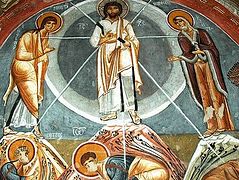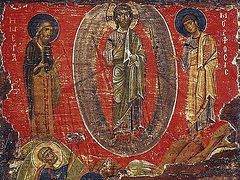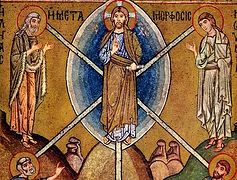In the name of the Father and of the Son and of the Holy Spirit!
Dear brothers and sisters, today is the feast of the Transfiguration of the Lord, and we must understand and assimilate its meaning and significance for ourselves. Through the Transfiguration, the Lord revealed the glory of His Divinity in humanity, in human nature, to show us to what glory He raises human nature within Himself, and through Him, every person. “The glory of the Transfiguration is our glory in the Lord Jesus Christ. He as if says to us: This is how all of you shall be!”1
The Gospel tells us that when the Lord prayed, His face shone like the sun, and his clothes became white as light. The sleeping apostles awakened: Christ was shining brighter than midday sunlight in His Heavenly glory. All believers are destined to become thus, in His name.
The soul of every person has its radiance, its glow, depending on the life he leads, and, according to the saints, takes a form corresponding to its inner spiritual mood, its state.
None of us now can see what is in the soul of another because of the coarseness of our bodies, behind which hides and is concealed the soul; but the angels and the saints, if they turn their gaze upon us, will see our souls, what they are like, and what is in them—because the state of the soul is seen within it. If there are good, merciful, grateful, and good-natured thoughts and feelings in it, then the soul is light, and the soul is enlightened in a special way at every good feeling that arises within us. When our conscience tells us that we are pure in all things, that we strive to walk before God and men according to the commandments, this testimony of the conscience is reflected in light all around our soul—and everyone in Heaven sees our radiance.
But if its thoughts and feelings are not completely pure, then the soul is not light and it is darkened and obscured by every impure feeling, appearing sometimes as a fog, and sometimes as the dark of night.
Thus, when the soul is outside of life in God , if the man indulges his passions and serves them, it is either grim like the darkest of nights, or drab like some kind of fog—when someone, who although he is not too given over to his passions, lives in vanity, in many cares, forgetting about God. And if the conscience has something to reproach us about, that we are impure, or fell away from God in something, then we are visibly darkened.
Thus, according to the saints, if we were able to ascend to Heaven and take on angelic vision, then, looking to Earth, we would see not a great mass of people, but various shades of light, semi-light, foggy, and dark.
You can find many testimonies to this in the lives of the saints.
During the lifetime of St. Andrew the Fool-for-Christ, there was an unmarried priest in Constantinople, a faster who sought for solitude and prayer. Everyone revered him. But St. Andrew met him and saw that he was adorned in some dark fog, with a snake entwined around his neck with the inscription: “The serpent of avarice.” That’s what was in his soul! And yet, no one saw it. Only the enlightened spiritual eyes of St. Andrew saw it. And the eyes of those who live in Heaven are even more enlightened. Thus, when we think no one sees us, who we are, a great multitude of eyes are beholding us: How many stars there are in sky! But there are even more eyes turned upon us.
This is how those in Heaven see us, and depending on what they see, they rejoice over us or mourn. But our guardian angels always see us even closer. Looking upon our internal disposition, state, and propensities—whether constant, sinful habits, or accidental, arising from some temporary, momentary improper fascination—they see who is darkened and who is bright.
Besides the angels and the saints, the dark powers also invisibly watch us. However, when our soul is light they cannot look upon it for they fear the light; they look upon it, they turn their gaze to it, only when it begins to darken. They are everywhere, and as soon as they notice a darkened soul, they immediately attack it and begin to confuse, to shake, to disturb it with bad, sinful, thoughts, passionate desires, and excitement of the senses.
Holy Hierarch Makary Nevsky wrote to one of his spiritual daughters, “Your letter is fraught with much that is unpleasant, joyless, unfriendly, gloomy, and desperate. It is not you that’s speaking, but an enemy spirit, a hater of mankind, whispering through the dark unpleasantness. He has covered your heart with a fog, and the poor thing never remembered the good Creator, Guardian, and Savior.”
When an evil spirit works upon us, “then darkness, despondency, doubt, discontent, irritability, weeping from disappointment, and other evils come into the soul. The poor soul flails about, not knowing where to rush off to. It is good if the soul remembers the Lord, tearfully telling him its misery, its desperation; the darkness will disappear, the demon runs away, and the sun will shine. Then our soul becomes peaceful, looks at everything joyfully, at sinners indulgently, on those who offend it—without offense… Around you and within you everything is dark, but it is temporary: Behind this darkness and storm, the Sun will shine and look upon your weakness, upon your sorrow. Only, be sure to open your soul to Him.”
The dark powers attempt to creep up on light souls, but they are turned back and stricken as with an arrow by beams of light. In the life of the Hieromartyr Cyprian and the Martyr Justina it is told that there was a magician, a sorcerer in Antioch, Cyprian. One young man asked him to use his magic to bring Justina to him, a beautiful Christian whom he wanted to take for a wife, but who did not want to look upon him. Several times Cyprian sent demons to her that were in his service, to stir her up in their way, to arouse passion for the youth within her; they came to her home, but they could not enter inside, and returned and said that they were repelled from there and scorched by the light from inside, because Justina was like a cloud adorned in light, and they could not look upon her.
This is an example of how light the soul is when it is Christian, clean in conscience, and devoted to the Lord. With a pure conscience, the fear of God fills the soul and preserves it inviolable. Then the Lord, Who is everywhere present and fillest all things, visits this soul and it becomes entirely light and shines like the heavenly luminaries.
It is said of St. Seraphim of Sarov that he often radiated light, especially during prayer in Church, and it was visible to all. There are many such testimonies in the patericons and hagiographies. For example, of one ascetic it is written that as soon as he stood in prayer and stretched his hands up to Heaven, rays of light flowed from all his fingers on both hands. It is said about another elder that his disciple came to him for something and knocked, but there was no answer. Then he bent down to look through a chink in the wall and saw that the elder was standing all in fire, like a pillar of light. Something similar is said of St. Tikhon of Zadonsk. Therefore, in the service to the saint, he is called а “Heavenly light, illuminated by the light of God.”
And according to the saints, the Transfiguration of the Lord, when He appeared entirely illuminated with light, has the same origin as these phenomena.
Upon transitioning to the other life, such effulgence of the soul is manifested naturally by itself. The writings of the saints tell how one day St. Anthony the Great, sitting and talking with his disciples, fixed his eyes upon Heaven and said: “I saw a pillar of light rising from Earth to Heaven. It was the soul of Ammonius, soaring to the Lord.” There are many such visions recorded.
And there is no doubt that only those in whom the grace of God has been received and begun its work to some extent, although perhaps not having time to penetrate their entire nature, will enter the Kingdom of Heaven.
The power of God (grace) acts within us from Baptism and is given, is communicated to us by the communion of the Holy Mysteries of the Body and Blood. And, as the saints say, it manifests itself if we walk through life in a Christian manner. Just as if we rub two sticks together there will be smoke, and then fire will appear, so too if we do not forget to walk in a Christian manner of life, then the power of God will constantly manifest its vivifying action within us.
The saints teach us that the power of God immediately begins to act within us if it does not meet any hindrances, any obstacles, in the form of a sinful, passionate life.
Our entire life should be devoted to God. The general law is this: Whatever you do, do it according to the will of God and to please God, to the glory of His all-holy name. Thus it is necessary to examine every matter that presents itself, to test whether or not it is in accordance with the will of God, and act upon only once you have made sure that it is precisely according to God’s will, and do it in the way that pleases God. Whoever always acts with such circumspection and such a clear awareness of pleasing God in the deeds he does, at the same time cannot but realize that his life is going right, that, although his deeds are not great or perfect, nothing is consciously admitted into them that would offend God or be unpleasing to Him. This awareness fills the human heart with a quiet peace from its tranquility of conscience and with the spiritual joy born of the feeling that it is not a stranger to God and that, although it is not great, not noble or notable, it is His servant, trying to please Him in every way and directing all its efforts towards this, and believing that God Himself sees it this way.
Everyone’s inner spiritual life should be this way. But what are the majority of people actually like? We live how we live. We do not have this conscious and active aim of pleasing God with all our works—both large and small—in either our thoughts or intentions. Things in our life are haphazard, and what is done is mainly business as usual, just because everyone does it that way—without any confidence in its suitability for the main objective of life.
A good spirit consists precisely in living for God, leaving all else behind. The opposite spirit is to live for yourself (egotism). This spirit very often, if not always, takes an adverse direction: to live for the world.
Thus, we can easily identify the spirit of our life: for whom we live, or, if we are just starting to live—for whom do we desire the most to live, what our heart breaks for, to whom we are more ready to devote our lives. Whoever lives for God has a God-fearing spirit, trying to please the one God. Whoever lives for himself has the spirit of a self-pleasing, egotistical, self-serving, or carnal life. Whoever lives for the world has a worldly or vain spirit. The saints advise us to determine by these characteristics what kind of spirit breathes within us.
Harmony, inner order, and arrangement within us begins only when we take the side of the will of God and establish an orderly life in our spirit as an indispensable law of our life. From the moment that such a decision emerges within us, the power of God begins to gather all the other forces of our nature, both spiritual and physical, and to arrange all their activities, maintaining within them what is good, and eradicating all that is bad. Then the peace of God, surpassing every intellect, will overshadow the inner temple of our nature. Then the God … of peace shall be with you (2 Cor. 13:11), says the apostle! Such a delightful and blessed state! This can also be called the transfiguration, resurrection, or restoration of the spirit.
What do the saints tell us? Begin little by little, and you will manage to do everything as you should. But if you don’t manage to do everything, as you would like, do it as you can. The Lord is not exacting about trifles. He values diligence and intention. He accepts our efforts to re-examine and reconstruct ourselves as a work already completed. However we must not abandon it, but intend to continue it, and continue it all the way to the end. We absolutely must arouse, strengthen, and establish within ourselves once and for all the most important thing—that is, the resolute intention to devote ourselves to the Lord. This is a necessary condition for receiving grace, the power of God, given in the Sacraments of Repentance and Holy Communion.
Under the influence of grace, at the same time that the soul is penetrated, imbued, and filled with it, it gradually brightens, just as the dark clouds disperse and the previously overcast skies becomes clear. Thus the soul, when it is entirely imbued with good thoughts, deeds, and disposition in God—that is, with grace, the power of God—becomes entirely bright light and shining like a heavenly body, like a radiant star, shedding its beams of light everywhere.
“Let Thine everlasting Light shine upon us sinners! Through the prayers of the Theotokos, O Giver of Light, glory to Thee!” Amen.





